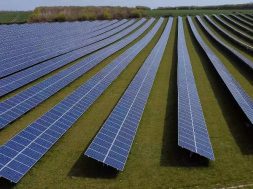
Domestic solar manufacturers body says confident of anti-dumping duty imposition
“We have a very just and strong case and, in our opinion, imposition of duty is imminent,” ISMA Spokesperson Dhruv Sharma said.
New Delhi: Indian Solar Manufacturer’s Association (ISMA), the petitioner in the anti-dumping probe by Directorate General of Anti-Dumping (DGAD) on solar panels, modules and glass from China, Malaysia and Taiwan, has said it is confident a duty will be levied following the investigation.
“We have a very just and strong case and consequently, in our opinion, imposition of duty is imminent. I cannot comment on the quantum of duty since it is a quasi-judicial process but we are sure the investigation will conclude in the favour of our petition,” ISMA Spokesperson Dhruv Sharma said.
The probe by DGAD was initiated after a petition was filed on in June 2017 by ISMA on behalf of Indosolar Limited, Websol Energy Systems, Jupiter Solar Power and Jupiter International. The petition sought initiation of anti-dumping investigation and imposition of anti-dumping duties concerning imports of solar cells from the three countries.
DGAD, in a notification dated November 21, said that a hearing for the antidumping investigation is scheduled to be held on December 12. “The oral hearing under the chairmanship of Sunil Kumar, additional secretary and designated authority was scheduled to be held on November 30. However, legal representatives of the domestic industry have sought postponement. Accordingly, the hearing has been rescheduled to December 12,” the notification said.
Sharma said as ISMA’s lawyers are travelling to China during the proposed period of Oral hearing, it had sought an extension. The hearing is now scheduled for December 12.
DGAD had prima facia found evidence of dumping of the goods from the three countries causing injury to the domestic industry. ISMA has alleged that imports from the three countries had gone up significantly as they were undercutting their prices causing severe financial loss to the Indian manufacturers.
“The DGAD’s team is in the process of verifying the data of the petitioners and have simultaneously started the process of verification of data of the respondent exporters form China and Taiwan etc. Considering the large number of respondent exporters, the process may take time but we are optimistic of an early and a favourable conclusion of our petition,” Sharma said.
DGAD was to seek the response of the stakeholders involved within 40 days of the initiation of the investigation. “Given the pace at which the investigations are moving, I contend that the entire process will conclude in the next couple of months,” Sharma added.
At least one industry executive said anti-dumping duty should be levied differentially for modules and cells. “Modules amount to around 8 GW capacity while cells are around 3 GW. As per average industry usage, capacity utilization in modules is hardly 50 per cent and it is relatively same for cells. Anti-dumping duty should be imposed differentially in terms of percentage on both modules and cells,” Karunesh Chaturvedi, Head–Corporate Affairs at Vikram Solar said.
He added that if a similar percentage is levied for both modules and cells, even imported modules will be cheaper than the Indian modules and as the developers would pay for the imported modules rather than domestic ones, it would negate the entire purpose.
According to Samir Kanabar, Partner at consultancy firm EY, while import duty would lead to higher costs for power producers, it will help in creating more domestic capacity in the long run. “An anti-dumping duty will be a positive sign irrespective of the percentage levied. It will certainly help domestic manufacturers,” he said.
Kanabar also added in case a duty is levied, it will encourage Indian companies to continue to utilize their capacity and would lead to more investment which would help in reducing fixed costs and make products more competitive.















